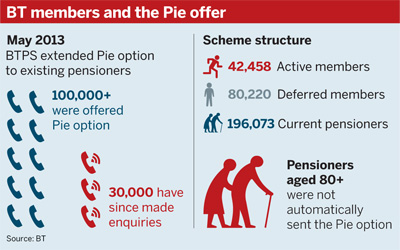BT 'pleased' as 30,000 members seek Pie advice
BT has attracted interest for its pension increase exchange exercise from more than 30,000 members, as one of the highest-profile employers to offer the liability-reducing tool.
These exercises offer members the chance to increase their initial pension in exchange for giving up future pension rises, and can be used by employers to decrease the cost of future pension promises and manage longevity risk.
Exceptions to Pie offer
- Those that retired after April 2009
- Those with a pension less than £500 per year that can be exchanged
- Pensioners aged over 80 not automatically included, but will be sent information letter
- Source: BT
Since April 2009, retiring BTPS members have been able to choose to receive a higher starting pension by giving up some of their future increases. BT began extending this option to existing pensioners in May of last year in a bid to give them more choice and flexibility.
“We’re pleased with the level of interest and that we’ve had over 30,000 people phoning up, to date, to go through the guidance process with an IFA,” said a spokesperson for the scheme.
Employers have generally offered Pies to increase retirement choices and reduce future liabilities in an attempt to make it cheaper to complete a buy-in or buyout.
“Some people would prefer not to take the risk, but if you follow the code of practice it can be win-win for everyone,” said Charlie Finch, partner at consultant LCP. “It can be an effective way of reducing cost.”
Managing the exercise
In June 2012 an industry working group composed a code of good practice for incentive exercises, put together following concerns over poor practice in the way schemes approached the exercises. It set out seven principles, including offering independent financial advice and ensuring communications were unbiased and clear (see box).
The code of practice initially led to fewer Pies being offered. “There was a bit of lull after it was issued, but in the past 12 months we’ve seen a resurgence in activity,” said Mike Smedley, pensions partner at consultancy KPMG.
Foregoing future benefits may raise concerns that pensioners will end up worse off in the long term, but some argue it may be better for pensioners to have more money when they first retire.
“The expenditure patterns for pensioners are higher when they first retire,” said Hugh Nolan, chief actuary at JLT Employee Benefits. “Over time the pattern of expenditure diminishes.”
The take-up of the exercises can be difficult to predict, which can place risk on the employer as it must commit money to the exercise beforehand.
“You have to work out how it’ll work, get all the communication ready and send everyone personal figures to say how much they would get,” said Smedley. “It’s not an enormous cost but it’s not trivial.”
There is therefore a risk that schemes could lose out when offering Pies as encouraging member engagement may be challenging.
“Mostly it’s just inertia,” said Nolan. “Sometimes people are put off by an active choice and if it’s for essentially the same value then what’s the point, it’s just a change in the shape.”
As well as Pies, some managers are looking at pre-retirement transfer options as a way to increase flexibility for members while reducing liabilities.
Pre-retirement transfer options involve educating their members about using cash-equivalent transfer values, which can be used to buy an annuity.
“There’s a grey area as to whether it’s covered by the [incentives exercise code of practice], but most employers want to comply with the spirit of the code if they’re offering them,” said Stuart O’Brien, partner at law firm Sackers.
Most Viewed
- What does Labour have in store for the pensions industry?
- LGPS latest: GLIL backers invest £475m for UK infrastructure push
- Dashboard costs rose by 23% in 2023, figures show
- Border to Coast launches UK strategy in major private markets push
- How the pensions industry can better support people with mental health problems


